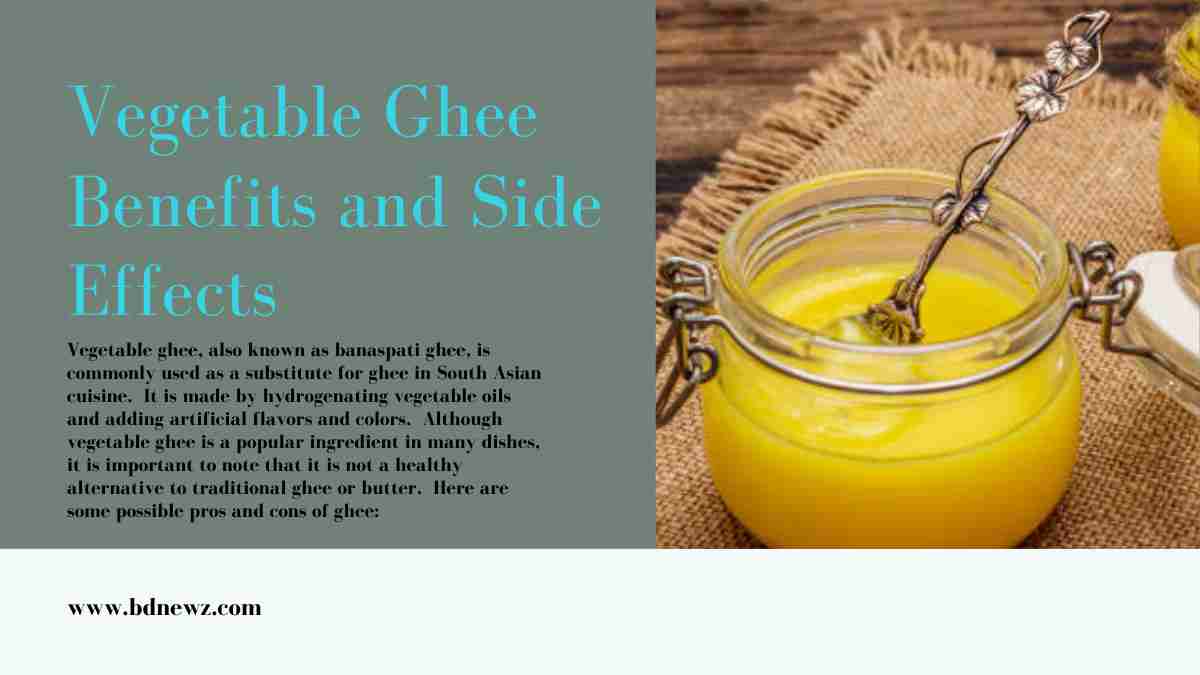Vegetable Ghee Benefits and Side Effects, a plant-based alternative to traditional ghee made from cow’s milk. Rich in vitamin A and free from cholesterol, vegetable ghee is ideal for various cooking methods.
Provides numerous health benefits including high smoke point. However, it is essential to be aware of possible side effects, especially for those with allergies or certain health conditions. Dive into the world of vegetable ghee and unlock its nutritional benefits while practicing moderation.
What is vegetable ghee
Vegetable ghee, also known as vanaspati ghee, is a plant-based clarified butter made from hydrogenated vegetable oils. It is a vegetarian alternative to traditional ghee, made from cow’s milk.
Vegetable ghee is ideal for various types of cooking, baking, sautéing, and deep-frying. It has a texture and appearance similar to lard but is cholesterol-free and has a buttery, nutty flavor that is slightly lighter than traditional ghee.
Vegetable Ghee Benefits and Side Effects
Vegetable ghee, also known as banaspati ghee, is commonly used as a substitute for ghee in South Asian cuisine. It is made by hydrogenating vegetable oils and adding artificial flavors and colors.
Although vegetable ghee is a popular ingredient in many dishes, it is important to note that it is not a healthy alternative to traditional ghee or butter. Here are some possible pros and cons of ghee:
Vegetable ghee benefits
Vegetable ghee is a plant-based clarified butter made from hydrogenated vegetable oils. It is a vegetarian alternative to traditional ghee, made from cow’s milk. Here are some of the health benefits of vegetable ghee:
Rich in Vitamin A: Vegetable ghee is an excellent source of Vitamin A, which helps maintain healthy skin and eyesight.
A Good Source of Medium-Chain Triglycerides (MCTs): MCTs are short-chain fatty acids that are absorbed and are believed to aid in weight loss.
Cholesterol-free: Vegetable ghee is cholesterol-free, making it a healthy alternative to traditional ghee.
High Smoke Point: Vegetable ghee has a high smoke point, which makes it ideal for deep frying and other high-heat cooking methods.
It is important to note that while vegetable ghee has some health benefits, it is still a high-fat food and should be consumed in moderation as part of a balanced diet.
Vegetable ghee side effects
Ghee is commonly used in cooking and baking as a substitute for butter or other animal fats. According to a nutritionist, there are certain health conditions where ghee should be avoided. Here are some side effects of ghee:
Allergic reaction: People who are allergic to milk should avoid ghee, as it is a dairy product. Ghee consumption can cause symptoms like rash, hives, vomiting, or diarrhea.
Heart disease: The presence of oxidized cholesterol in ghee can increase the risk of various diseases, including heart disease. Due to the presence of fatty acids, it increases the risk of heart attack.
Liver-related ailments: If you already have liver-related ailments like jaundice, fatty liver, or gastrointestinal pain, you should avoid ghee as it can cause serious organ problems.
It is important to note that ghee is not harmful for everyone and has many health benefits. It is packed with vitamins, omega-3 fatty acids, and antioxidants.
However, if you have any of the above-mentioned health conditions, it is best to consult your doctor before consuming ghee.
What is vegetable ghee made of
The ingredients of vegetable ghee are almost entirely made of solid vegetable oils and are free from any milk products. Its ratio of saturated, monounsaturated, and polyunsaturated fatty acids is [4.4], [3.7], and [10.0], which is an improvement on the ratio of natural ghee.
If you are interested in making ghee at home, here is a simple recipe:
- Heat unsalted butter in a heavy-bottomed saucepan over medium heat.
- Once the butter has melted, lower the heat and let it simmer for 20–25 minutes.
- The butter will begin to foam and bubble. Keep stirring occasionally.
- Once the foam subsides, the butter will begin to turn golden brown and have a nutty aroma.
- Remove the pan from the heat and let it cool for a few minutes.
- Strain the ghee through a cheesecloth or fine-mesh strainer into a clean, dry bowl.
- Store ghee in an airtight container in the refrigerator for up to 3 months.
Remember that ghee is not harmful for everyone and has many health benefits. However, if you have any health problems, it is important to consult a doctor.
Conclusion
Vegetable ghee is a cholesterol-free plant-based alternative, providing health benefits such as vitamin A and MCT. Despite its benefits, restraint is important due to possible allergic reactions and risks with certain health conditions. Consult your doctor for personal advice.
